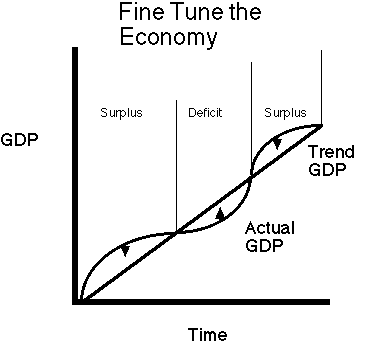
During the period that the actual GDP is above the GDP trend meaning that the economy is overheated and runs the risk of demand push inflation the government should run a surplus. During a recession when the actual GDP is below the GDP trend the government spends the accumulated surplus to stimulate the economy. Over the business cycle there is no debt.
Besides the problem of timing there is a basic political problem in fine tuning the economy pointed out by James M. Buchanan. Legislators and the President want to get reelected. Before the tax cut of 1964, politicians believed they were obligate to balance the budget. They interpreted Keynesian fine tuning in their self interests of wanting to get reelected and assumed that they never had to balance the budget since given goodies to constituents would get them reelected and such actions could be justified by their interpretation of Keynes. Remember Keyes proposed his policies for a depression not for fine tuning the economy.